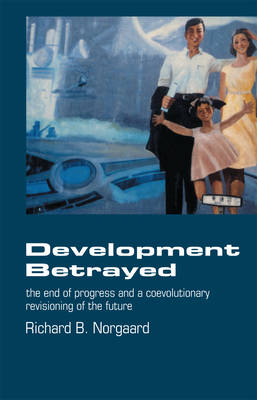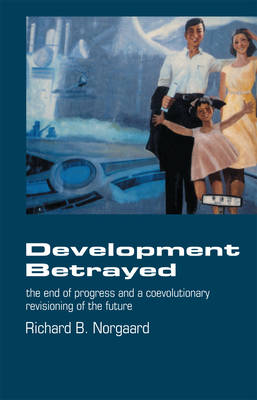
Door een staking bij bpost kan je online bestelling op dit moment iets langer onderweg zijn dan voorzien. Dringend iets nodig? Onze winkels ontvangen jou met open armen!
- Afhalen na 1 uur in een winkel met voorraad
- Gratis thuislevering in België vanaf € 30
- Ruim aanbod met 7 miljoen producten
Door een staking bij bpost kan je online bestelling op dit moment iets langer onderweg zijn dan voorzien. Dringend iets nodig? Onze winkels ontvangen jou met open armen!
- Afhalen na 1 uur in een winkel met voorraad
- Gratis thuislevering in België vanaf € 30
- Ruim aanbod met 7 miljoen producten
Zoeken
Development Betrayed
The End of Progress and a Co-Evolutionary Revisioning of the Future
Richard B Norgaard
Paperback | Engels
€ 96,45
+ 192 punten
Uitvoering
Omschrijving
Modernity promised control over nature through science, material abundance through technology and effective government through rational, social organization. Instead of leading to this promised land it has brought us to the brink of environmental and cultural disaster. Why has there been this gap between modernity's aspirations and its achievements? Development Betrayed offers a powerful answer to this question.
Development with its unshakeable commitment to the idea of progress, is rooted in modernism and has been betrayed by each of its major tenets. Attempts to control nature have led to the brink of environmental catastrophe. Western technologies have proved inappropriate for the needs of the South, and governments are unable to respond effectively to the crises that have resulted.
Offering a thorough and lively critiques of the ideas behind development, Richard Norgaard also offers an alternative co-evolutionary paradigm, in which development is portrayed as a co-evolution between cultural and ecological systems. Rather than a future with all peoples merging to one best way of knowing and doing things, he envisions a future of a patchwork quilt of cultures with real possibilities for harmony.
Development with its unshakeable commitment to the idea of progress, is rooted in modernism and has been betrayed by each of its major tenets. Attempts to control nature have led to the brink of environmental catastrophe. Western technologies have proved inappropriate for the needs of the South, and governments are unable to respond effectively to the crises that have resulted.
Offering a thorough and lively critiques of the ideas behind development, Richard Norgaard also offers an alternative co-evolutionary paradigm, in which development is portrayed as a co-evolution between cultural and ecological systems. Rather than a future with all peoples merging to one best way of knowing and doing things, he envisions a future of a patchwork quilt of cultures with real possibilities for harmony.
Specificaties
Betrokkenen
- Auteur(s):
- Uitgeverij:
Inhoud
- Aantal bladzijden:
- 296
- Taal:
- Engels
Eigenschappen
- Productcode (EAN):
- 9780415068628
- Verschijningsdatum:
- 17/03/1994
- Uitvoering:
- Paperback
- Formaat:
- Trade paperback (VS)
- Afmetingen:
- 156 mm x 234 mm
- Gewicht:
- 453 g

Alleen bij Standaard Boekhandel
+ 192 punten op je klantenkaart van Standaard Boekhandel
Beoordelingen
We publiceren alleen reviews die voldoen aan de voorwaarden voor reviews. Bekijk onze voorwaarden voor reviews.











